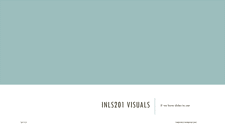Consider this statement
... a good technology, firmly related to human needs, cannot be one that has a maximum productivity as its supreme good; it must rather, as in an organic system, seek to provide the right quantity of the right quality at the right time and the right place for the right purpose ... The center of gravity is not the corporate organization, but the human personality, utilizing knowledge, not for the increase of power and riches, or even for the further increase of knowledge, but using it, like power and riches, for the enhancement of life.
Lewis Mumford, "Bacon: Science as Technology," reprinted in Interpretations and Forecasts: 1922-1972
(New York, Harcourt Brace World, 1981), p. 16
quoted on pp. 75-76 in Schewe, P. F. (2007). The grid: A journey through the heart of our electrified world. Washington, D.C: J. Henry Press.
What was he talking about? Is it relevant to you?
Then read this short article
How Real-Time GPS Threatens London 'Knowledge', Nicole Ferraro, Editor in Chief, Future Cities
with some supporting information at an 8 December 2011 BBC article, Brain changes seen in cabbies who take 'The Knowledge'
as well as a cabbie with "the knowledge" explaining his perspective.
Are you worried that your brains may be rewiring themselves in ways that may not benefit you?
Then read this longer article
Carr, Nicholas. Is Google Making Us Stupid? The Atlantic, July-August 2008.
Finally, watch this presentation and think about what Lessig is describing
But do Lessig's issues even matter any more?
You will be compelled to watch the entire ad; don't skip it or you wont hear the discussion that follows
[top]
OK, what should we think about all this?
Bring to class examples of how information technology is either improving or damaging your future and plan to discuss them in class
We will ask each of you to write on the white boards examples of a positive future or a less than positive future as more and more information technology becomes part of our lives.
Think about whether or not our legalistic world and our technological world can work together, or if one or the other will have to change itself to adapt to change.
Remembering back to when I discussed the information world of LTG Fred Franks in the First Gulf War and said that sometimes we have to make decisions based on what we think we know and not on the information we have, ask yourself if your information tools will enhance your ability to make informed decisions or if they will become crutches that will limit your ability to work without them.
There is no necessary correct answer, but there is a necessity to participate
[top]
One more thing ...
We will discuss where we have been and offer thoughts about what might be a good way to evaluate what we have learned
[top]
and a second one more thing ...
You have an evaluation to do
Evaluations
Carolina Course Evaluation
Course evaluations will be handled by a system called Class Climate. Everything - from email reminders to data compilation - will be done through Class Climate. You can expect to see that evaluations will go out during the second to last week of classes. From there Class Climate will handle the rest; it will notify and remind students that they must complete their evaluations. Evaluations will end during finals.
As part of the Class Climate course evaluation process at the end of the semester, SILS has its own additional evaluation questionnaire for its courses. This questionnaire was originally developed by ILSSA. The questions are open-ended and allow you to provide more specific comments about each course. The responses to these questionnaires are aggregated and then distributed to the instructor for the course. They are intended solely for the instructor to improve this particular course or his/her teaching in general. In order to serve that purpose, we need to hear from each of you.
You may complete this form at your leisure, but it would also be very appropriate for you to complete it in class on the last scheduled session.
[top]


